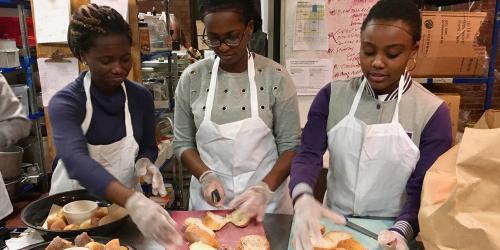Community service is an integral component of The MasterCard Foundation Scholars program. Wellesley MasterCard Foundation Scholars honored their commitment to service and volunteerism in November with a Day of Service at Haley House Bakery Café in Roxbury, Mass., a nonprofit that offers local, underserved neighborhoods food and the power of community.
The MasterCard Foundation Scholars program is a global initiative to educate and develop next-generation leaders who will contribute to social and economic progress. It supports international students, particularly from Africa, who are committed to giving back to their communities, by providing scholarships, skills training, counseling, and mentoring, as well as opportunities for volunteerism and experiential learning.
Scholars nationwide coordinate an annual Day of Service as part of their service component. They understand that learning how to make a difference in their home countries begins with contributing to communities in their current environment. “As part of The MasterCard Foundation’s mission—to raise the next generation of African leaders—it is important that we are able to give back to our immediate communities and the world at large in any way we can,” said Sandra Ohemeng ’20, who is from Ghana.
In selecting a beneficiary for their service day, the Wellesley MasterCard Foundation Scholars wanted to address an area of great need. The World Food Programme, the food assistance branch of the United Nations, estimates that one in nine people—about 795 million—“do not have enough food to lead a healthy active life.” Deciding to address hunger led the group to Haley House, an organization that is celebrating its 50th anniversary of providing culinary education and meals, as well as affordable housing and employment programs, to underserved communities.
The MasterCard Foundation student council representative, Ngina Kariuki ’19, who hails from Kenya, organized the service day with the assistance of Slater International Center Staff and Haley House volunteer coordinator Eric Martin. The nine participating students’ activities centered around Community Tables, a pay-what-you-can dinner hosted every Saturday evening at Haley House in an intimate, restaurant-style setting filled with community artwork.
Hospitality Hostess Fulani Haynes, a local jazz musician who is a longtime Haley House employee and volunteer, welcomed the students and introduced them to other volunteers and community members. The group shared a meal before guests arrived for the main dinner, to experience the food and learn more about the community through conversation.
“Haley House is not just a place to serve food, but it is a place also meant to empower people and encourage them to get back a life,” said Kariuki. “We are serving food with a purpose, to transform their lives, to give them community. The food is grown by the community, serves the community. And when they are eating, people are brought together.”
Following their meal, the students donned aprons, gloves, and hairnets to work alongside the chefs to prepare the larger meal. They set up tables, welcomed guests, served food, and attended to the 60 guests’ needs during the dinner. Later, they cleared tables, washed dishes, and packed unused food to be served the next day at the Haley House Soup Kitchen in Boston’s South End.
After mopping floors and making sure that the space was in good order, the scholars sat down to talk with Haynes. She explained the history of Haley House and the significance of the names written on the walls—a list of around 1,000 collected by The Counted, a project conducted by The Guardian to name those killed by law enforcement in the United States in 2016. Haynes also discussed the many positive developments in Black communities, and encouraged the scholars in their endeavors.
“[Haynes] reinforced what I know about what Black people here endure,” said Lisa Luka ’18, from Zimbabwe. “She also discussed the importance of eating well and taking good care of yourself. Being away from our families in Africa, we have to take care of ourselves here.”
Dagmawit Libanos Assefa ’20, who is from Ethiopia, summed up her volunteer experience: “I was glad that the house could serve high-quality food to people who need it and that we were able to help. Helping there gave [me] a small sense of giving back and the importance of serving people. I could see that the chefs making the food were happy about doing it. I learned that it is fulfilling to be able to serve people.”




